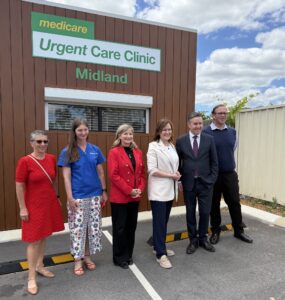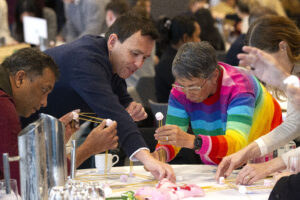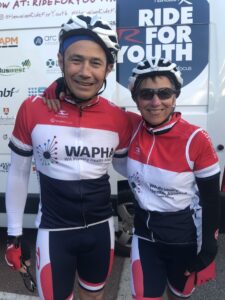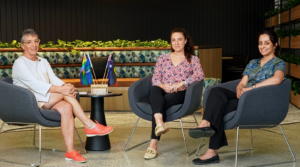“Health equity has been a driver throughout my entire career, and despite the challenges and slow progress towards this goal, it remains my north star.”
This enlightening Q&A with our CEO Learne Durrington was recently published in Croakey Health Media.
You can also watch the recording of the Health Equity Heroes webinar, where Learne joined fellow panelists Mel Briggs, Hayley Longbottom, Dr Elizabeth Deveny and Karl Briscoe to share their leadership stories.

Q: Please tell us a bit about your day job – what does a typical day look like?
I am an early riser, which can mean a 4am alarm call on days when I ride or when I have an early meeting. A typical day is always topped and tailed by looking at emails, many of them from the east coast, which can be challenging given the time difference.
Being effective is crucial, so I look at my diary and spend some time preparing so I am across the diverse topics arising, so I can contribute effectively and make sound decisions. Each day is full of variety, which I love.
Q: Where did your health leadership journey start? When did you start to think of yourself as a leader?
Once I understood the systemic factors and could describe the interplay between the forces that contribute to inequity, my purpose in my work was clear. That clarity was pronounced through my early leadership roles in child protection and family violence from the mid ‘80s through to the early 2000s and has driven me ever since.
As a CEO, of course I have to make tricky decisions and manage risks, but I view leadership as a collaborative effort in guiding a team or organisation. Leadership is as much a team sport as well as individual capability. So, I have never really considered myself to be a leader per se, more one of a team who are focused on achieving the same outcomes.
Q: Who have been key mentors and influencers for you along the way? Please tell us a bit about them and how they contributed to your leadership journey?
I have never sought out mentors, rather meeting them has always been accidental or serendipitous. I recall one of my university social work lecturers provided that allowed me to really understand the inequity or injustice that is endemic in the care system.
What I learnt through this lecturer was the salient theory that rather than focus on an individual’s behaviour, it’s vital to see that individual as part of larger interconnected system – families, communities and society in general. These underlying systems shape people’s lives so, for example, where a person resides will often determine their health status. So, it’s social determinants that can unduly effect people’s health and wellbeing and in turn reflect health inequity. Learning this helped me make sense of the world but moreover inequity and marginalisation. It was an aha moment that has profoundly influenced not only my work but my life in general.
Then again, when I worked in child protection, I had a tough manager with a can-do attitude who made a big impression on me. She gave me support to just crack on and use my initiative.
What I’ve admired in others is courage. Having confidence and knowing I will make mistakes but overall, it’s better to have the courage to have a go!
Q: What does leadership mean to you? How do you enact it, how do you see others enact it?
I read Meeting the Ethical Challenges of Leadership: Casting Light or Shadow by Craig E Johnson that talked about the shadows that can undermine ethical leadership.
As a leader, it’s crucial to understand your true motivation, which shouldn’t be about power. You also need to be transparent, fair, and open to diverse voices and approaches. This helps in managing change, a common leadership challenge.
I always focus on values and outcomes, and as a servant leader on enabling people and organisations to achieve equity. Servant leadership is about putting the needs of others first and creating a culture where people are supported and empowered to develop and perform to the best of their ability. Ultimately, we are all here to serve the community.
Q: What did you learn about leadership during COVID, whether from your own experiences, or watching others?
It was wonderful to watch how everybody wanted to contribute to get the critical things done we needed to do. All hands-on deck.
During a crisis, people wanted to help and make a difference. It was wonderful to experience such unity and contribution under an existential threat.
Q: What does ‘leadership for health equity’ mean to you, and how is it different to other forms of leadership?

It is about being clear on the goals and necessary actions crucial to improving health equity. It means making decisions that might not be popular with everyone, but which are nonetheless the right ones.
I think it always boils down to getting the best from people for a shared purpose and WA Primary Health Alliance is well positioned with staff committed to making a difference, as we are beyond just achieving a viable bottom line or share price. We need to keep our values and purpose top of mind and align all activities accordingly.
Q: What styles of leadership do you find ineffective or off-putting?
People who are absolutists, or micro managers, which is an oxymoron. Arrogance is another trait that has no place in leadership and people who seek power rather than seeking to serve.
Q: If you had to give a typology for leadership styles that you see most often in the primary healthcare sector, how would you describe these?
There is a range, but thankfully most people want to use their skills for the betterment of others.
Again, I don’t think it is vastly different to any other sector, we have the same continuum.
Q: What have been your biggest wins as a leader? What enabled these, and what difference have these wins made?
Winning the tender to operate the three WA Primary Health Networks in early 2015. This success was due to having a team who trusted me and placed their faith in my ability to complete the task, because it was the right decision for the system rather than taking a smaller more parochial view.
Along with our strong partnerships, our statewide structure allows us to deliver better health, together for the benefit of the WA community.
The WAPHA model is unique among PHNs and is accepted by our funder, the Australian Government Department of Health and Aged Care, as the optimal model for efficiency and effectiveness.
But we do not rest on our laurels and know we need to continue to refine and improve our operating model and ways of working, to ensure we can best support those who rely on us.
Q: When have you failed or not achieved what you’d hoped? What can be learnt from these experiences?
We have not shifted the dial on health equity globally, noting industrialised countries do not have the same excuse as developing nations.
We need to link social determinants like housing and education to health, as they currently operate in silos, but we need to aim higher and get cross sector collaboration as a norm.
We have had some micro wins in the work we are doing here in WA, through some of the service we have co-designed and commissioned.
For example, we collaborated with Mindspot to build in GP referral and feedback in contrast to their universal entry point. The result was Mindspot GP that provides mental health care in rural and regional locations that previously had no access to psychology through Better Access. In addition, a high proportion of Aboriginal people are using this service, through a tailored program.
Q: When you began your leadership journey, our lives were not being shaped by Big Tech and the climate crisis was not so present in our lives. What difference have these trends made for your leadership?
Technology is essential for the way we live and work both now and into the future, but we need to ensure it is fit for purpose and used for good.
The compassionate conversation in a palliative care setting or when unwelcome news is being delivered face to face is irreplaceable. Technology can and should support and connect the health system and the people who use it, but not replace care of people.
However, I have actively encouraged digital transformation, both locally and nationally with WAPHA being the lead PHN for several digital programs such as the data and analytics storage platform Primary Health Insights and the general practice clinical decision support and data extraction tool, Primary Sense. This is predicated on the growing importance of using data to drive decision making, and these enablers are supporting Primary Health Networks to achieve their objectives.
Climate change requires us to plan for the impacts of natural disasters and support the primary health care sector to respond. As a community, we must prepare for the future by integrating health care considerations with climate policy and action. Recent floods and natural disasters highlight the need for more integrated planning.
Q: On related matters, what is different about being a leader, now versus in 20 years’ time (i.e. 2044), versus being a leader 20 years ago (i.e. 2004)?
Leading with purpose and a focus on who we serve is a predominant theme today compared to 20 years ago. Moreover, employees’ expectations are that organisations are authentic with their values, and in our context purpose driven.

Additionally, employees are increasingly skills orientated to enable them to laterally take up opportunities, compared to the past where predominance of knowledge drove career opportunities. Today it’s agility, capability, capacity to drive and adapt to change as well as the use of digital tools to manage work. Employees now come from varying professional backgrounds with portable skills and transferable knowledge, thus the nature of the workforce is dynamic
The one thing that is a constant is that leaders today need be adept at handling change, to be on the front foot, be future focussed and outcome orientated.
Q: How do you maintain your own wellbeing in a busy, demanding leadership role?
I am part of an amazingly supportive cycling group, and we train diligently, so very early mornings several times a week are the norm for me.
I do a big charity Ride for Youth each year to raise money for youth mental health in the regions, which is a huge motivator. Happy for people to contribute to this great cause!
As well as exercise, I think a healthy diet, doing something with other people, reading the odd book and making sure you have down time are all very important.
Q: Who are the leaders (from any field) who most inspire you? And why?
Leaders who drive reform and change, particularly in the Aboriginal health sector where they need to balance accountability to their community while operating under challenging circumstances.
I find their tenacity and commitment to their people is nothing short of remarkable.
Q: For young leaders, what advice do you have?
Leadership roles are a gift, but they come with responsibilities. The principles of authenticity and humility are important for any leader.
It is crucial to listen effectively, maintain a positive attitude, and view each day as an opportunity to learn from others. True collaboration is key along with an inspiring vision.
Q: What is your overall diagnosis of the state of the primary healthcare sector in Australia, and what is your vision for what it could be?
I believe we are at a tipping point which could be really positive for the future of primary care. The current structure is being challenged and will need to adapt to survive.
My personal vision is for all primary care clinicians to be able to work at the top of their scope and collaborate as teams. We really need to maximise the potential of the primary care clinical workforce, and consider alternative models in areas experiencing workforce shortages, such as many of the regional and remote areas of WA.
We have some great exemplars in WA of highly effective primary care services, doing great things with multidisciplinary care and I would like to see that proliferate.

A great example is the multidisciplinary team at Pramana Medical Centre. They support over 6,000 patients, 60 per cent being First Nations people, along with people from multicultural backgrounds, people experiencing homelessness, and people with disabilities. They focus on addressing the social determinants of their patients’ health care in parallel with their medical needs.
I recently interviewed one of their GPs and associate directors, and they have just won a Medicare Champion Award at the inaugural Stronger Medicare Awards in Canberra.
Q: Any other reflections?
Only that I thought that by now, we would have nailed the social determinants of health by working collaboratively, so that is both a disappointment but also a motivator.
